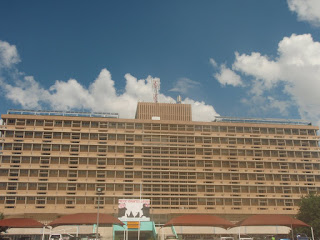Authors: Audrey Eisemann, Laura Overton and Tamara Siburg
Week 13
While Apartheid ended 21 years ago, as has been portrayed in many of these blog posts, the effects of Apartheid continue to be prevalent in Namibian society today. Those in Namibia who are black and coloured in general have fewer privileges and more obstacles than white Namibians. These privileges are highly due to the advantages gained by white Namibians through having generations of wealth in their families that many black and coloured Namibians do not have. While this is not true for 100% of the cases, it is true for enough to be an indicator of significant disadvantage.
This issue is no different when it comes to healthcare system. Those who are more wealthy have the privilege to have access to medical aid which enables them to utilize the private hospitals, while those with less privilege and who cannot afford medical aid must rely on under-funded, under-staffed, state hospitals. Since lack of wealth is one of the obstacles that many black and coloured people have to overcome in Namibia, many are forced to rely upon government run hospitals, and do not have access to the more technologically advanced and thorough healthcare at private hospitals.
This past week we visited a private hospital, Roman Catholic Hospital, and a government hospital, Katutura State Hospital. The differences in treatment due to funding and staff were blaringly obvious from the infrastructure, the equipment and the queues.
Roman Catholic Hospital is a privately-owned hospital nestled in the center of Windhoek. Their brochure states: “Our mission is to provide a Christian based quality nursing care service. We endeavor to provide compassionate health care for those suffering from illness and to help them find psychological and spiritual stability and peace” (Roman Catholic Hospital).They have a full staff of nurses and doctors with nurses there twenty four hours a day, and at least one doctor who is on duty at all times in the casualty department. Like in private hospitals in the United States, patients can be turned away. If patients do not have adequate medical aid, which is our version of health insurance, they will not be treated at the hospital. To be admitted to the Roman Catholic Hospital, a deposit covering the estimated cost of the procedure, service or operation is required. Throughout the semester we have learned about the inequality among races within Namibia that is left over from Apartheid. We have been taught that Namibia has the highest rate of inequality in the world. By charging such a high admission to be admitted to a private hospital, the segregation between different races within Namibia is perpetuated.
Katutura State Hospital is a state-run hospital. The government provides it with all of its funds. While at the hospital we noticed how impersonal the feeling of being in there was compared to the private Roman Catholic  Hospital or even to state owned hospitals back home in the United States. One of the sisters that were showing us around at the Roman Catholic Hospital even told us that the state hospital is set up more like a business then a caring family. Due to socioeconomic inequalities, the lower class can only afford to go to the Katutura State Hospital. The most expensive price that on anything the hospital offers to its patients is 30 Namibian dollars. Staying overnight 1 night or even 3 weeks will both only cost a person 30 Namibian dollars. But if a patient needs to be in the hospital for a (photo: Outside of Katutura State Hospital) few days that means the more money they lose for missing work. When we asked why the hospital was so under staffed because they did not have the funds to pay the doctors and nurses a salary comparable to that of the private hospital. It is good for the patients without a lot of money needing care to come to the hospital because cheap prices, yet if the hospital can’t keep the doctors and nurses then one would have to ask what quality of care do the patients receive at the state hospital and how time efficient for the patient would it be.
Hospital or even to state owned hospitals back home in the United States. One of the sisters that were showing us around at the Roman Catholic Hospital even told us that the state hospital is set up more like a business then a caring family. Due to socioeconomic inequalities, the lower class can only afford to go to the Katutura State Hospital. The most expensive price that on anything the hospital offers to its patients is 30 Namibian dollars. Staying overnight 1 night or even 3 weeks will both only cost a person 30 Namibian dollars. But if a patient needs to be in the hospital for a (photo: Outside of Katutura State Hospital) few days that means the more money they lose for missing work. When we asked why the hospital was so under staffed because they did not have the funds to pay the doctors and nurses a salary comparable to that of the private hospital. It is good for the patients without a lot of money needing care to come to the hospital because cheap prices, yet if the hospital can’t keep the doctors and nurses then one would have to ask what quality of care do the patients receive at the state hospital and how time efficient for the patient would it be.

1 comment:
Alive Vitamins - Good post. Thanks for the experience to share with us. I am going to save the URL, and will certainly visit again.
Post a Comment